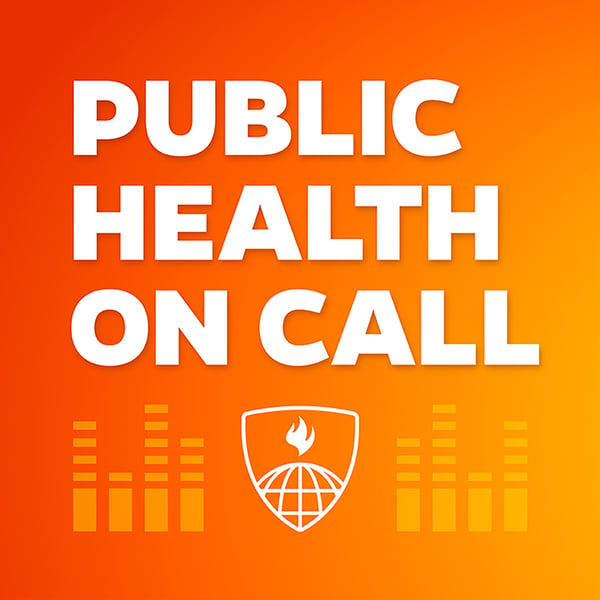868 - COVID-19 Convalescent Plasma: From Emergency to Everyday
Public Health On Call
The Johns Hopkins Bloomberg School of Public Health
4.8 • 620 Ratings
🗓️ 13 March 2025
⏱️ 12 minutes
🧾️ Download transcript
Summary
About this episode:
In the early days of the COVID-19 pandemic when there were no vaccines or treatments, convalescent plasma—antibody-containing blood from people who recovered from COVID—saved countless lives through Emergency Use Authorization. In this episode: special guest host Thomas Locke of MMI Monthly: From Bench To Breakthrough discusses the evolution of CCP therapy, from emergency use during the pandemic to now, nearly five years later, crossing the finish line with recent FDA approval as a potential treatment for immunocompromised patients.
Guest:
David Sullivan is a professor in Molecular Microbiology and Immunology and a researcher at the Johns Hopkins Malaria Research Institute.
Host:
Thomas Locke is the host of MMI Monthly: From Bench to Breakthrough and Malaria Minute, podcasts from the department of Molecular Microbiology and Immunology at the Johns Hopkins Bloomberg School of Public Health.
Show links and related content:
-
Bloomberg School Researchers Support First Blood Center to Receive Full FDA Approval to Provide Convalescent Plasma for Patients Who Are Immunocompromised—Johns Hopkins Bloomberg School of Public Health
-
Convalescent Plasma Offers ‘Blueprint’ For Future Pandemics—The Hub
-
How a Boy’s Blood Stopped an Outbreak—The Wall Street Journal (Opinion)
Transcript information:
Looking for episode transcripts? Open our podcast on the Apple Podcasts app (desktop or mobile) or the Spotify mobile app to access an auto-generated transcript of any episode. Closed captioning is also available for every episode on our YouTube channel.
Contact us:
Have a question about something you heard? Looking for a transcript? Want to suggest a topic or guest? Contact us via email or visit our website.
Follow us:
-
Here's our RSS feed
Note: These podcasts are a conversation between the participants, and do not represent the position of Johns Hopkins University.
Transcript
Click on a timestamp to play from that location
| 0:00.0 | Welcome to Public Health On Call, a podcast from the Johns Hopkins Bloomberg School of Public Health, |
| 0:05.9 | where we bring evidence, experience, and perspective to make sense of today's leading health challenges. |
| 0:16.3 | If you have questions or ideas for us, please send an email to Public Health Question at jh.h.u. |
| 0:23.8 | That's Public Health Question at jh.edu for future podcast episodes. |
| 0:31.1 | Hey, listeners, it's Lindsay Smith-Rogers. |
| 0:33.7 | In the early days of the COVID-19 pandemic when there were no vaccines or treatments, |
| 0:38.9 | convalescent plasma, antibody containing blood from people who recovered from COVID-19, |
| 0:44.7 | saved countless lives. |
| 0:46.9 | Today, we bring you an episode from our friends at the podcast, MMI Monthly, from Bench to Breakthrough. |
| 0:52.9 | Guest host Thomas Locke talks about how nearly five years later, convalescent plasma has received |
| 0:59.0 | FDA approval to be used as a potential treatment for immunocompromised patients. |
| 1:04.5 | Let's listen. |
| 1:06.2 | Hello and welcome to MMI Monthly, a podcast sharing public health stories from Bench to Breakthrough. |
| 1:12.6 | I'm Thomas Locke. Today we focus on the evolution of COVID-19 convalescent plasma, CCP, |
| 1:19.8 | from its emergency use during the pandemic to a newly approved treatment protecting |
| 1:24.2 | immunocompromise patients against COVID-19. |
| 1:31.9 | Our podcast follows the news that One Blood, a not-for-profit blood center in Florida, |
| 1:37.1 | has had its application to manufacture and distribute convalescent plasma for COVID-19, |
| 1:39.3 | fully approved by the FDA. |
| 1:42.7 | This is the first ever approval for convalescent plasma. |
| 1:45.1 | To understand how we've got here and the significance of that approval, we need to go back to the early days of the pandemic. Because it's here |
| 1:50.8 | that the idea of using convalescent plasma for COVID-19 was born. Here's David Sullivan, MD, an infectious |
... |
Please login to see the full transcript.
Disclaimer: The podcast and artwork embedded on this page are from The Johns Hopkins Bloomberg School of Public Health, and are the property of its owner and not affiliated with or endorsed by Tapesearch.
Generated transcripts are the property of The Johns Hopkins Bloomberg School of Public Health and are distributed freely under the Fair Use doctrine. Transcripts generated by Tapesearch are not guaranteed to be accurate.
Copyright © Tapesearch 2025.

